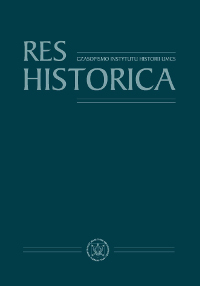Denigrating Ethnic Others as Animals and Monsters in the Middle Ages: the Case of the „tailed English”
Denigrating Ethnic Others as Animals and Monsters in the Middle Ages: the Case of the „tailed English”
Author(s): Wojciech MichalskiSubject(s): History, Middle Ages
Published by: Wydawnictwo Naukowe Uniwersytetu Marii Curie-Sklodowskiej
Keywords: tailed English – motif; ethnic invective; ethnic stereotypes; monstrosity – middle ages
Summary/Abstract: The article takes a close look at the opinion that the Englishmen had tails as an example of negative attitudes towards alien ethnic groups held by medieval societies, that manifested itself in describing these groups’ members as animals and monsters. The author presents the oldest records mentioning the belief, emphasizing their diffusion already in the second half of the 12th century. He places an emphasis on the references in which the Englishmen are identified with animals because of the accusation of having tails. The most interesting account of this kind is Proprietates Anglicorum. Its creator advancesthe logical argument which he concludes that the inhabitants of Rochester punished byGod with tails are monsters. The author stresses that this record follows the vigorousdebates of the turn of the 14th century about the humanity of so-called monstrous races.In the following part of the article he analyses the explanation of disfigurement describedby Jean d’Outremeuse (Ly myreur des histors). The author also examines the accounts in which an affiliation of the tails of the English to a species is provided. In this way the pejorative symbolism of the animals is assigned to these people as well. Just as in thecases of other groups accused of monstrosity and having tails, the invective thrown atinhabitants of England determines their identity as a people who are not fully humanand hence are fundamentally diff erent from those who off end them. Such humiliation– questioning of their humanity through an accusation of being an animal or a monstermust be perceived as especially harsh. It was the very harshness of the invective that was the reason for its popularity.
Journal: Res Historica
- Issue Year: 2022
- Issue No: 54
- Page Range: 33-55
- Page Count: 23
- Language: English

